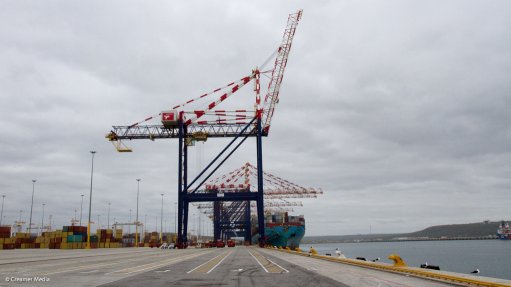
The World Bank Group advises ports to rapidly increase their digitalisation efforts over the short to medium term – one to six months – in an effort to reduce the frequency of people- and paper-based contact, says World Bank Group global lead for transport connectivity and regional integration, Martin Humphreys.
He says this is one of the key measures to ensure the resilience of the transport sector as the world grapples with the effects of the Covid-19 pandemic.
“We recommend the introduction of mandatory appointment systems [at ports] to avoid waiting [for collection and deliveries], and to limit contact. We also recommend that ports improve their cybersecurity systems.”
Humphreys adds that ports could also review the structure and scale of their port tariffs to incentivise off-peak working.
Other measures that could assist ports during the Covid-19 pandemic include investigating the increased use of automation in cargo operations, and to prepare a green port strategy that would allow for a reduction in energy consumption and operating costs.
In the road-freight sector, the World Bank Group recommends the gradual liberalisation of the movement of truck drivers by adopting multiple entry or visa-free entry for truck drivers to increase the flexibility of cargo operations.
“And we recommend the regional harmonisation of trucking regulations, particularly in health testing and results recognition, vehicle standards and licensing arrangements,” notes Humphreys.
“Many economic bodies have been working on this for many years in Africa, and although all of them promote this, the reality on the ground is still some way from optimum.”
Humphreys says the World Bank Group is also advocating the implementation of quality-based competitive licensing in the road-freight sector, which takes into consideration the financial, legal and ethical status of companies, as well as the quality of the trucks and the skills of the company’s drivers, to allow them more freedom from regulation.
“In terms of increasing border agency collaboration and facilitating trade, we recommend the increased use of IT . . . to minimise physical contact,” says Humphreys.
He adds that customs and other agencies should work together to design special regimes to expedite the clearance of critical commodities, such as food stuff, medical equipment, medicine and Covid-19 testing kits.
“We strongly recommend the introduction of an effective transit guarantee scheme to reduce costs and improve the efficiency of cross-border traffic. It is always a surprise to me that the southern cone of Africa, which seems so eminently suited to realise significant gains [from this], still doesn’t have an effective transit guarantee scheme,” says Humphreys.
He notes that the World Bank Group also advises border agencies and the private sector to work together to undertake the pre-assessment of imports through advanced screening of documentation, in order to identify and prioritise certain imports prior to their arrival.
“Finally, we also recommend that government authorities work closely with the private sector and identify service standards and inspection procedures for critically needed items,” says Humphreys.
* Humphreys spoke during a Southern African Transport Conference webinar.